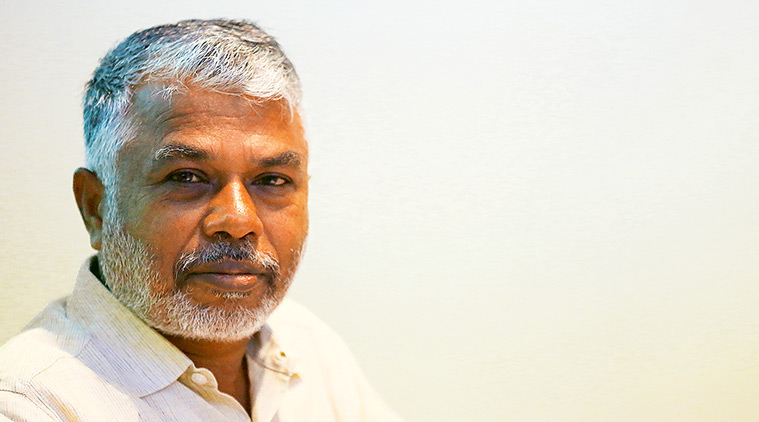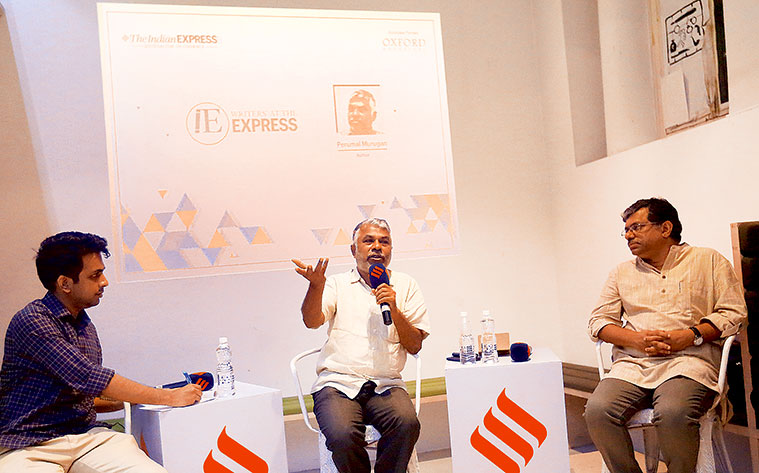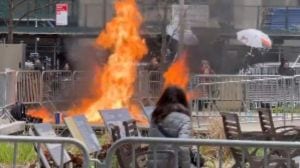- India
- International
‘Forms of protest our democracy adopted are Gandhian’ says Tamil author Perumal Murugan
The first Indian Express readers’ club session featured Tamil author Perumal Murugan who spoke of his humble beginnings, the politics of his work and the power of silence.
 Quiet Story: Tamil author and public intellectual Perumal Murugan. (Photos: Tashi Tobgyal)
Quiet Story: Tamil author and public intellectual Perumal Murugan. (Photos: Tashi Tobgyal)
The inaugural edition of ‘Writers At The Express’ reading club, introduced by The Indian Express literary editor Pratik Kanjilal, featured contemporary Tamil author and public intellectual Perumal Murugan, who was in conversation with senior associate editor Amrith Lal and was translated from Tamil to English by senior sub-editor Ram Sarangan.
Excerpts:
You were born in a community where you didn’t have access to literature when you were growing up. But you’ve said, you knew at a very young age that writing was your calling. Could you take us through the kind of books you read in your youth, and how you became a writer?
I was the first in my family to finish school and the first in my village to go to college. My mother would once a week buy groceries, which came wrapped in newspapers. She preserved them in order to burn them during the rainy season. I started by reading those scraps of paper from popular Tamil magazines like Ananda Vikatan and Kumudam.
When I was young, I felt alone. I lived in a part of agricultural land that only had four to five houses in the vicinity. Between the houses, too, there was a lot of distance. At such times, I started writing. I would scribble on bits of paper or a notebook, write songs and poems. At my cousins’ house, I would read magazines, comics and novels. We exchanged books with their neighbours and had a sort of a reading circle. My periyamma (aunt) could see how interested I was in reading and would keep aside magazines, comics and books when I visited during my quarterly or half-yearly breaks.
In Class VIII, my Tamil teacher discovered that I would write poetry and songs in notebooks. I was sent for various school competitions where I received books as prizes — these were the first books I received that weren’t textbooks. I treasured them. I would also read poetry by famous pre-Independence Tamil poets like Bharathiyar, Bharathidasan, Namakkal Kavignar, and I would try to imitate their metres, form and idioms. This gave me a lot of recognition among my peers and teachers.
Do you remember the first poem that you published?

I didn’t get published until my college years. I would publish poetry and short stories in college magazines and other platforms. The first standout short story I published was in August 1988 in a prominent magazine called Kanaiyazhi, then run by Delhi-based journalist Kasturi Rangan.
When I was pursuing an MA in Coimbatore, my professor Maruthanayakam helped foster my love of reading and writing. I would write one-two stories a week and take them to him. I was waiting for the day he would tell me to send something to be published in a magazine. I would keep on writing and he would keep on receiving them. One day he called me, made me give a title (Nigalvu) to the short story I had given him to read and asked me to send it to Kanaiyazhi, an extremely prestigious Tamil magazine. I was elated just to send it, irrespective of whether it got published or not. At the time, the very famous Tamil writer Ashokamitran, who was the editor-in-charge of the magazine’s Tamil Nadu region, wrote me a note praising the short story, it read: ‘Let there be an opportunity for the story to be published in a magazine’.
 Perumal Murugan with IE senior associate editor Amrith Lal (right) and senior sub-editor Ram Sarangan at Oxford Bookstore, Delhi. (Photos: Tashi Tobgyal)
Perumal Murugan with IE senior associate editor Amrith Lal (right) and senior sub-editor Ram Sarangan at Oxford Bookstore, Delhi. (Photos: Tashi Tobgyal)
When did you start writing longer fiction, like Eru Veyyil (1991)?
When I came to Chennai (in 1989) to pursue higher studies, PhD and so on, I got introduced to a lot of Marxist-Leninist (M-L) groups, which at the time were very popular in Tamil Nadu; there were 10-15 in the state alone. And each group would run a political and literary magazine. I was introduced to one such magazine Mana Osai, run by the prominent editor Pa Jayaprakasam. Through my introduction to the group, I found my first big platform for writing. I also lived in the office of Mana Osai for two years and picked up all the work of bringing out the magazine, besides writing a few times a week. Between 1989 and 1991, I published over 20 short stories in the magazine. My economics professor Suresh praised the way I depicted the Kongu Nadu dialect, and said my mastery over this dialect is so good that I should write a novel. With that encouragement, I published my first novel Eru Veyyil in December 1991. I was a PhD student and 24 years old.
If it was a subtle psychological exploration of the politics of marginalised communities in your first novels, Eru Veyyil, Current Show (1993), and Seasons of the Palm (2000), in Madhorubhagan (2010) and Poonachi (2017), the politics becomes the inner dynamic of the novel. There seems to be a shift from your M-L outlook to a realisation of the role of caste in society, a kind of Periyarite understanding of the society. If you could speak about the transition in your politics?
When I was on the editorial board of Mana Osai, I was introduced to a lot of M-L philosophies. The M-L groups wouldn’t accept either Gandhi’s or Periyar’s ideologies. They blamed Gandhi for Partition and the resulting chaos and Periyar not as a revolutionary but as a reformer of sorts. I grew to like Periyar’s ideologies, I found the language familiar. Periyar was from Erode, wrote in the Kongu Nadu dialect, and spoke to the common man. Secondly, Periyar also spoke against caste in a very direct, practical way, about breaking down caste in everyday society and seeing the repercussions of such a system. This was quite radical at that time, because even the M-L groups wouldn’t acknowledge caste as an issue in itself. They believed when the revolution would be over, caste as a problem would disappear automatically. Periyar was one of the first to engage with caste in an analytical manner.
In your recent piece for The Indian Express, you wrote that your decision to disengage with the critiques of Madhorubhagan was driven by two concepts of Gandhi — his use of silence and distancing. You use silence as a form of protest, especially in times when any word/speech can invite criticism. How did you use the two ideas for your politics?
A lot of the forms of protest that we adopted as a democracy now, such as pinning a black flag to yourself or carrying black flags or undertaking a hunger strike, I believe, originated from Gandhian ideology and principles. Before that if one were to go on a hunger strike, for example, it would be in a different context, it would be a personal move, it would be in the light of certain community practices or rituals. It was Gandhi who took something like that and made it a very effective form of protest. Namakkal Kavignar, the poet, who penned a line about Gandhian principles that became very popular in Tamil Nadu, said, ‘Kathiyindri, rathamindri, yuthamundru varaguthu (Without knives, without blood, a war approaches)’. He used the word war, because it was a form of protest, it was a way of accomplishing your goals without shedding blood. And during the controversy over Madhorubhagan, I found a way to stand against the negativity, criticism and the attacks on my person using these principles.
Among the many bloodless protests and activities you’re engaged in, you also collaborate with Carnatic singer TM Krishna, who now makes it a point to sing at least one Murugan poem in his concerts. There’s a poem you wrote for him about manual scavenging. Could you talk about your interactions with the musician and the songs you’ve been writing for him?
Carnatic music, largely in Tamil Nadu, is a very traditional establishment, it’s very insular, it doesn’t allow for much fresh air to enter, be it in terms of the singers, the audiences, or the sabhas who hold these events. They have always been largely alien to the common people, only a select few participate in such gatherings. I felt Krishna was the one who broke through all these established conventions. He would get on a corporation bus and sing or go to a beach and start performing there. The people who performed with him in these settings would often use folk songs. He felt that 90 per cent of the keerthanaigal performed in Carnatic gatherings are of a devotional nature and there was very little by way of other things such as nature or human experiences that creep in. When I struck up a friendship with Krishna, he asked me to write about these things and he would sing them. I was a little hesitant initially but I thought if Krishna, who in such an unapproachable environment, is asking me to write about these things, I shouldn’t be the one to hesitate. I began by writing the Panchabhootam keerthanaigal, which focusses on the five elements in nature. This concept has been done previously but was always approached from the angle of devotion and divinity. When I wrote it, I observed each element — earth, air, etc. — in itself. Krishna was extremely happy on receiving it and said he would perform this keerthanai.
In one keerthanai on palm trees, Krishna said the way I described it made it sound like I am describing a god, like god’s avatar, this is what is tangible and close to us. This is what I should be writing about. Another popular one is about love, Nee mattume en nenjil nirkkirai (Only you are in my heart), that has been performed at so many of Krishna’s concerts that you could even find it on YouTube. I also wrote five keerthanaigal on five birds, among them the koel, sparrow, crow and owl. Krishna first looked at the crow one but eventually decided to perform the one on the owl. Regarded as an inauspicious sign in a lot of Tamil communities, it is said that if you hear the owl’s voice, it means death is calling. Krishna likes to speak about things that haven’t been spoken about so far. I wrote about the owl at a residency programme in Puducherry, where at night, it gave us company. The voice of the owl was the voice of darkness itself and I wrote in the keerthanai: Darkness has a voice, it is the owl’s voice.
(Magsaysay award winner) Bezwada Wilson and (social activist) Aruna Roy would also ask Krishna, ‘You’re singing about all these things that weren’t previously allowed in these spaces, so, why don’t you sing something about manual scavengers as well?’ Krishna then asked me to write something about the community for him to sing. This took me about six months, because I didn’t know which angle to approach this from, since this was an issue which was very much a part of the social consciousness. Eventually, I decided to go with “hands” as the focus of the keerthanai, because hands were usually regarded as something with which to perform uyirvana vishayangal (higher tasks). How can the same hands be expected to lift excrement?
There are two words in Tamil used to describe excrement: malam and pee. The former can be used on stage and in formal gatherings, pee, on the other hand, is a much coarser term which can’t be used in public spaces. So, when I wrote the keerthanai, I wrote malam, but asked Krishna to substitute the malam for pee at one of the places and see what happens. Krishna first performed this keerthanai at a poetry festival in Bengaluru. He did as was asked. This gave him some thought and he came to me and said, ‘Why are we so hesitant, afraid, think so many times and stutter over something as simple as the use of a word when there are still people who lift, carry and clean away excrement by hand?’
Another thing, Periyar spent his life combatting social structures of Brahminism. Krishna sang a song about Periyar at a Carnatic concert, a keerthanai about how Periyar’s statue was demolished and pulled down. This is what Krishna does — take these topics which have previously been taboo in spaces and perform them. I’m happy that Krishna is doing that and that I’m a part of it. He says there’s also an element of self-interest involved here, for Carnatic music to survive and flourish in the future, these new songs, themes and modes of singing have to enter these spaces instead of the things singers had been singing 150-200 years ago.
Straight Talk
Caste awareness
People like to say, cities are free of caste. But take the example of Vadachennai (North Chennai), where there is still a lot of discrimination, which is also the subject of a recent film. Through Periyar, Marx, M-L movements, Tamil Nadu always had a parallel discourse to engage with and even surpass conservative mindsets.
Silence
Silence is very important to a writer. Silence, in a literary work, is the space where readers can participate. As a literary device, it helps uplift a narrative. A writer cannot say everything, some things should be omitted, said in a veiled fashion, or implied. Outside of literary works, it renders the weapons of the opponents useless. If you don’t speak a word, anything they can do will automatically be neutralised. Had I said anything during the controversy around Madhorubhagan, it would have added oil to a raging inferno. Because I maintained silence, the controversy had to die down.
Murugan, the teacher
I’m more proud to be a teacher than a writer. At the government arts college where I teach, many of my students are the first in their family to go to college. I consider it important to lift their perspectives above what their social realities would allow. I also host a monthly gathering on my home’s terrace, a space I call koodu (nest), where students recite poems, read out short stories, review a book, explore things otherwise difficult to accomplish within the confines and censorship of a government college. Last month, a drama based on transgender person A Revathi’s autobiography was performed.
Apr 19: Latest News
- 01
- 02
- 03
- 04
- 05






































